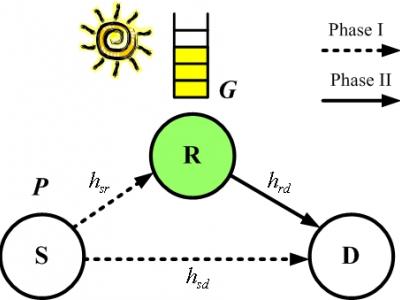Documents
Research Manuscript
On Energy Harvesting Gain and Diversity Analysis in Cooperative Communications

- Citation Author(s):
- Submitted by:
- Meng-Lin Ku
- Last updated:
- 23 February 2016 - 1:43pm
- Document Type:
- Research Manuscript
- Categories:
- Log in to post comments
The use of energy harvesting cooperative relays is a promising solution to battery-limited wireless networks. In this paper, we consider a cooperative system in which one source node transmits data to one destination with the assistance of an energy harvesting decode-and-forward (DF) relay node. Our objective is to minimize the average symbol error rate (SER) performance, and a Markov decision process (MDP) is formulated to find the optimal stochastic power control at the relay that adapts the transmission power to the changes of energy harvesting, battery, channel and decoding states. We derive a closed-form expression for the exact SER of the cooperative system. Further insights are gained by analyzing the asymptotic SER and its lower and upper bounds at high signal-to-noise ratio (SNR), and the performance is eventually characterized by the stationary state probability of the MDP at the worst channel states for which the decoding is successful but the relay keeps silent. We also find that the optimal cooperative policy at asymptotically high SNR follows a threshold-type structure, i.e., the relay spends the harvested energy only when the signal is successfully decoded and the source is faced with the worst channel condition in its direct link. Using these formulas to quantify the diversity gain and the energy harvesting gain, we reveal that full diversity is guaranteed if the probability of harvesting zero energy quantum is zero, which can be achieved by reducing the energy quantum size or increasing the energy harvesting capability. Finally, we present several numerical examples to validate the analytical findings.

